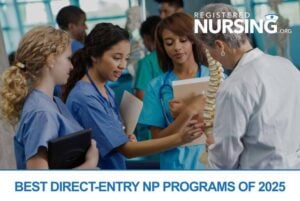Is Getting Your ADN Worth It for Your Nursing Career Goals? Pros vs. Cons of an Associate’s Degree in Nursing

The decision to pursue higher education in the field of nursing often begins with a fundamental choice: whether to obtain an Associate Degree in Nursing (ADN) or a Bachelor of Science in Nursing (BSN). ADN programs typically take two to three years to complete and have become a popular entry point for aspiring nurses. However, many individuals question whether investing time and resources into obtaining an ADN is truly worth it in the long run.
In this article, we will delve into the advantages and disadvantages of obtaining an ADN, examining factors such as career opportunities, earning potential, and the ongoing trend toward higher educational standards in nursing. By the end, you’ll better understand whether pursuing an ADN aligns with your nursing career goals and aspirations.
The ADN Program: A Snapshot
Before we weigh the pros and cons, let’s briefly overview what an ADN program entails. An Associate Degree in Nursing is a two-year program offered by many community colleges and vocational schools. These programs typically include a mix of classroom instruction and hands-on clinical experience in healthcare settings. The curriculum covers essential nursing skills, medical knowledge, and clinical rotations to prepare graduates for entry-level nursing positions. Graduates of ADN programs are eligible to sit for the NCLEX-RN exam, which is necessary to become a registered nurse (RN).
The Pros of Getting Your ADN
Enter the Workforce Swiftly
One of the most significant advantages of pursuing an ADN is the relatively shorter time frame required to become an RN. Traditional BSN programs typically take four years to complete, while ADN programs can often be completed in two to three years. This means that ADN graduates can enter the workforce more quickly, start earning a salary, and gain valuable hands-on experience.
Shorter Program = Lower Tuition Costs
ADN programs are typically more affordable than BSN programs, making them an attractive option for budget-conscious individuals seeking to minimize student loan debt. Community colleges, which often offer ADN programs, tend to have lower tuition rates than four-year universities.
Flexibility to Pursue a BSN Later
Many ADN programs are designed with flexibility in mind. Graduates who hold an ADN and obtain their RN license can choose to work while pursuing an RN to BSN through online or part-time programs. This allows for career progression and the potential to increase earning potential down the road without putting careers on hold.
Clinical Experience
ADN programs provide students with hands-on clinical experience, which is invaluable for developing practical nursing skills and building confidence in a clinical setting. This real-world experience is crucial for becoming a competent and effective nurse.
Demand for RNs is High
The demand for registered nurses continues to be strong. ADN graduates often find ample job opportunities in various healthcare settings, including hospitals, clinics, long-term care facilities, and home healthcare. This high demand for RNs can lead to job security and a wide range of employment options.
The Cons of Getting Your ADN
Limited Career Advancement
While an ADN provides a pathway to becoming an RN and entering the nursing profession, it can limit career advancement opportunities compared to a BSN. Many leadership positions in nursing, such as nurse manager or nurse educator roles, require a BSN or higher.
Earning Potential
While ADN graduates can secure well-paying nursing positions, BSN-educated nurses tend to have a higher earning potential over the course of their careers. Many healthcare institutions offer higher RN salaries or incentives to BSN-prepared nurses, particularly for specialized roles or leadership positions.
Evolving Nursing Standards
The healthcare industry is continually evolving, and nursing is no exception. There is a growing trend toward raising the educational standards for nurses. Some healthcare facilities prefer to hire BSN-educated nurses to meet these evolving standards. As a result, ADN graduates may face more competition and potentially limited job options in certain areas.
Potential for Future Education Barriers
If you aspire to pursue advanced practice roles in nursing, such as becoming a nurse practitioner or nurse anesthetist, you will typically need to hold an MSN degree or higher. BSN-prepared nurses may have a smoother path when seeking admission to graduate nursing programs.
Evolving Scope of Practice
In some states, there are discussions about expanding the scope of practice for nurses, which may require higher educational qualifications. While ADN-educated nurses are currently eligible for RN licensure, future changes in nursing regulations could impact their scope of practice.
The Bottom Line: Is Getting Your ADN Worth It?
The decision to pursue an ADN should be based on individual goals, circumstances, and long-term career aspirations. Obtaining an ADN can be a pragmatic choice for those who prioritize a faster entry into the nursing profession, have financial constraints, or are open to pursuing a BSN later while gaining work experience.
However, it’s essential to be aware of the potential limitations of an ADN, particularly in terms of career advancement and earning potential. As nursing continues to evolve, having a BSN or higher may become increasingly valuable. Therefore, individuals who are certain they want to pursue advanced nursing roles or aspire to leadership positions may find it more advantageous to start with a BSN program.
Whether getting your ADN is worth it depends on your personal circumstances, career goals, and the specific opportunities available in your region. It’s crucial to weigh the pros and cons carefully, consider your long-term aspirations, and make an informed decision that aligns with your nursing career path.
Latest Articles & Guides
One of the keys to success as a registered nurse is embracing lifelong learning. Our articles and guides address hot topics and current events in nursing, from education to career mobility and beyond. No matter where you are on your nursing journey, there’s an article to help you build your knowledge base.
Browse our latest articles, curated specifically for modern nurses.



